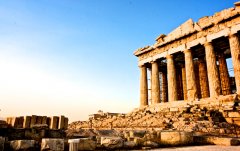Interesting Facts about Athens Greece

 Well known as the Cradle of Civilization, Athens prides itself for being the origin of democracy, Western philosophy, Olympic Games, political science, Western literature, major mathematical principles, and theatre. Many prominent rulers, philosophers, writers, politicians, and scientists, including Alexander the Great, Socrates, Aristotle, Pericles, Plato, and Sophocles belonged to this amazing city of Greece. The history of Athens spans around 3, 400 years. Mycenaean civilization was the first human civilization that reigned Athens during 1900-1100 BC. During 5th and 4th century BC, Western civilization bloomed in the womb of Athens mainly because of its political and cultural achievements. Situated at the centre of Greece, it also became the preferred destination for trading around 900 BC and today Athens is a popular tourist place with its majestic monuments and impeccable architecture. The plethora of historical sites and attractions introduce visitors with its fascinating, rich, and virile past. These historical attractions along with modern advancements put an everlasting impression on the visitors. Read on and explore the ancient city of Athens in the following section.
Well known as the Cradle of Civilization, Athens prides itself for being the origin of democracy, Western philosophy, Olympic Games, political science, Western literature, major mathematical principles, and theatre. Many prominent rulers, philosophers, writers, politicians, and scientists, including Alexander the Great, Socrates, Aristotle, Pericles, Plato, and Sophocles belonged to this amazing city of Greece. The history of Athens spans around 3, 400 years. Mycenaean civilization was the first human civilization that reigned Athens during 1900-1100 BC. During 5th and 4th century BC, Western civilization bloomed in the womb of Athens mainly because of its political and cultural achievements. Situated at the centre of Greece, it also became the preferred destination for trading around 900 BC and today Athens is a popular tourist place with its majestic monuments and impeccable architecture. The plethora of historical sites and attractions introduce visitors with its fascinating, rich, and virile past. These historical attractions along with modern advancements put an everlasting impression on the visitors. Read on and explore the ancient city of Athens in the following section.
Fast Facts
Country: Greece
Language(s) Spoken: Greek
Demonym: Athenians
Districts: 7
Area: Urban: 412 sq. km
Metropolitan: 2, 928.717 sq. km
Municipality: 38.964 sq. km
Population: Urban: 3, 074, 160 (in 2011)
Metropolitan: 3, 737, 550
Municipality: 655, 780
- Athens spreads across the central plain of Attica and is bounded by four large mountains, namely, Mount Pamitha, Mount Penteli, Mount Aegalio, and Mount Hymettus.
- Athens is named after Athena, the goddess of wisdom, who defeated Poseidon to become the patroness of the city.
- It is believed that the city has experienced every form of government till date, whether democracy, capitalism, socialism, communism, or any other.
- During the period of democratic government, Athens had 500 jurors to decide whether the culprit was to be punished or not. The offender was not allowed to hire a lawyer and therefore he himself spoke in defence. Speeches were timed by a water-clock and punishment included both death and penalty.
- Citizens even paid taxes and these funds were used for celebrations and development of the city.
- The journey of one of the largest international events, Olympics Games, started from Athens in 776 BC. With some modifications and alterations in the ancient form, the modern Olympics, that we know today, were launched in the year 1896.
- Olympics was such an important event in ancient Athens that the athletes who backed out were fined for their cowardice.
- The presence of the temples of Greek gods makes Acropolis hill the most sacred place of Athens. Greeks refer it to as sacred rock.
- The Parthenon Temple, located on the acropolis hill, is dedicated to goddess Athena. This temple is known to have endured all natural calamities, invasions, and attacks except the greed of Lord Elgin, the Ambassador of Constantinople, who sold all its statutes, vases, and monuments to the British museums.
- Many scholars believe that theatres originated from Athens. The structure of theatres that we see today is based on Greek theatres having semi-circular sitting with rows of seats.
- The theatres portrayed tragedies and comedies. Tragedies were based on wars and sorrows faced by Greeks and the characters wore dark coloured clothes whereas comedies were based on everyday life and the characters wore light coloured attire.
- Presence of 148 theatre stages makes it the city with the largest number of theatrical stages.
- The popular and ancient theatre stage, Odeon of Herodes Atticus, is the main venue for Athens festival, which is celebrated from May to October.
- The planetarium located in Andrea Syngrou Avenue, known as the Athens Planetarium, is one of the largest and best equipped digital planetaria in the world.
- Sports are one of the important parts of Athenians’ lives. Apart from Olympics, various other major events; such as, Summer Olympic Games, UEFA Champions League, Euroleague finals, and many other sporting events have been hosted in Athens.
- The major stadiums of Athens include, Athens Olympic Stadium, Karaiskakis Stadium, Peace and Friendship Stadium, and Olympic Indoor Hall. All of these stadiums have state-of-the-art sports and entertainment complexes.
- The National Archaeological Museum, located in Athens, houses almost 5, 000 years old artefacts. The antiquities from Neolithic Age to Roman Greece Age can be seen here.
- The National Archaeological Museum, The Benaki Museum, The Byzantine and Christian Museum, The Numismatic Museum, The Museum of Cycladic Art, and the New Acropolis Museum are important and must watch museums of Athens.
- The Arch of Hadrian, a gateway to honour emperor Hadrian, is also found in Athens. It is 18 meters high with two inscriptions on it. The one facing Acropolis says ‘this is the Athens, the ancient city of Theseus’ and the other side says ‘this is the city of Hadrian and not of Theseus.’
- Pegasus and Unicorn, one of the most fantastic and mythological characters, have references in the Greek mythology.
- UBS, the Swiss global company, ranked Athens as the 32nd richest city according to purchasing power parity. It has also been ranked as the 25th most expensive city in the world.
- Due to various human activities, Athens experiences the urban heat island effect. Elefsina and Tatoi suburbs of Athens recorded a temperature of 48.0 °C on 10 July 1977 that ranked Athens first in the record books of World Meteorological Organisation for the highest temperature ever being recorded in Europe.
- One can find various architectural styles in Athens ranging from Greco-Roman to Neo-Classical to modern.
- The public buildings constructed in the 19th century, under the guidance of Theophil Freiherr von Hansen, and Ernst Zille represent the neo-classical style. Athens Academy, Athens City Hall, Greek Parliament, Old Parliament (1875–1932), University of Athens, and Zappeion Hall are the finest examples of neo-classical style.
- Konstantinos Doxiadis, Dimitris Pikionis, Pericles A. Sakellarios, and Aris Konstantinidis are among those great architects who transformed the neo-classical style to international and modern style during 1930s-1960s.

